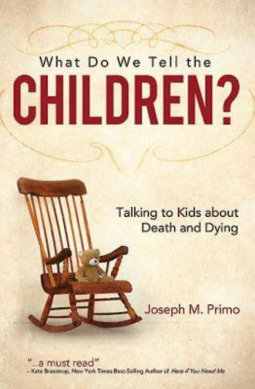
What Do We Tell the Children?
Talking to Kids About Death and Dying
by Joseph M. Primo
This title was previously available on NetGalley and is now archived.
Send NetGalley books directly to your Kindle or Kindle app
1
To read on a Kindle or Kindle app, please add kindle@netgalley.com as an approved email address to receive files in your Amazon account. Click here for step-by-step instructions.
2
Also find your Kindle email address within your Amazon account, and enter it here.
Pub Date Sep 17 2013 | Archive Date Dec 20 2013
Description
Advance Praise
What Do We Tell the Children could reasonably be titled What NOT to Tell the Children,
namely, how to grieve. Joseph Primo has allowed the children he works with to
teach him the most important lesson anyone of us can learn, which is that grief
is part of a healthy, human, emotional repertoire. Provided with gentle,
respectful, and loving support, even young children who have been exposed to
great tragedy can emerge with a greater capacity for empathy and compassion.
The stories Primo retells from his own work are compelling and filled with many
teachable moments about life and death. The book is encouraging for parents and
others fearful of "doing it wrong" or (scarier still!) "having
already done it wrong!" A must read for anyone caring for the
grieving.
-- Kate Braestrup, New York Times Best-Selling Author of Here If You Need
Me
Joe Primo has written an impassioned plea for long-overdue changes in
our attitudes toward death. In reading this book, you will not only gain
valuable ideas about how to talk with children about death, you will likely
learn a great deal about yourself. In his wise, funny, poignant, winsome
and inimitable way, Joe Primo tells stories that will help you examine your own
thoughts and feelings about death and dying. You might discover ways in
which you inadvertently create unnecessary obstacles for children who are seeking
to process the impact of the death of a parent or sibling, a grandparent or
other loved one. In the end, this is a book about the power of love, and about
overcoming our own anxiety so that we can offer grieving children our
compassionate presence and steady support as they create meaning in their own
way and at their own pace.
--Deborah van Deusen Hunsinger, Charlotte W. Newcombe Professor of Pastoral
Theology, Princeton Theological Seminary
Joseph Primo has given us a great gift. What
Do We Tell the Children: Talking to Kids about Death and Dying is a
wonderfully sensitive book -full of illustrative stories and gentle
wisdom. Parents, teachers, and counselors will find it a necessary guide
in engaging children in meaningful and needed discussions about death and loss.
- Kenneth J Doka, PhD, Professor, The College of New Rochelle, Senior Consultant, The Hospice Foundation of America
Joseph Primo’s book, What Do We Tell the Children, has opened up a
new conversation about grief and the way children deal with loss. Having worked
in an Army hospital in Iraq, I’ve experienced firsthand the difficulties of
dealing with death—before, and after the war. It’s never easy, even for
those who’ve dealt with it on a daily basis. What Do We Tell the
Children should be given to every military household who has lost
someone.
--Michael Anthony, Iraq War veteran and author of: Mass Casualties: A
Young Medic’s True Story of Death, Deception, and Dishonor in Iraq
Joe Primo’s What Do We Tell the Children? could have been also
titled What Do We Tell the Grown-ups? He has written a book
for a wide audience; but I read it first and foremost as a professional, a
practicing physician, and a teacher working in hospice and palliative
care. I believe that Primo provides a solid introduction for
medical students and residents as they move into the responsibilities of
supporting entire families, not just children, not just adults. Readers of all
ages should take seriously his advice to start with close scrutiny of our own
experiences of grief. Then we can sense when we are ready to proceed beyond the
first steps of support and when we should refer the children to
others.
I
recommend What Do We Tell the Children? to those in all walks
of life charged with the tough and tender task of supporting children in their
grief. This will promote our work together for the children.
--Scott Long, MD, PhD, Professor at Yale University School of Medicine and
Physician at The Connecticut Hospice
Available Editions
| EDITION | Other Format |
| ISBN | 9781426760495 |
| PRICE | $17.99 (USD) |



